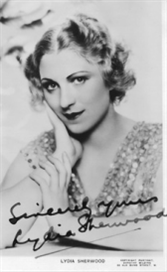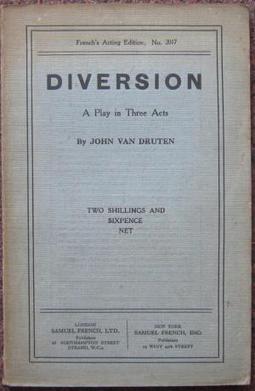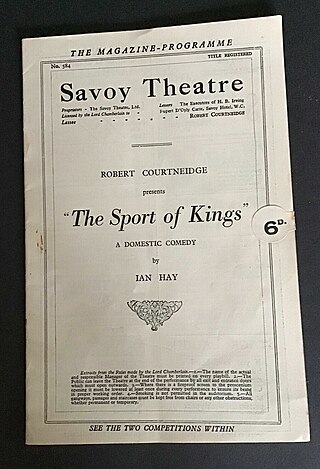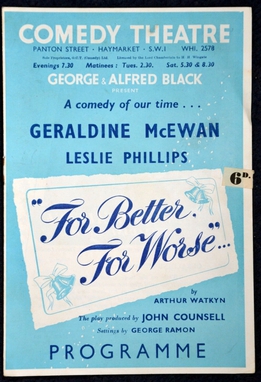
Lydia Sherwood was a British film actress and stage actress. She made her debut on stage in Daisy Fisher's comedy play Lavender Ladies. She was married to the poet Lazarus Aaronson from 1924 to 1931.
The Old Man is a 1931 mystery play by the British writer Edgar Wallace. Its original production was staged at Wyndham's Theatre in London's West End for a ninety performance run. It is set entirely in the "Coat of Arms" tavern where a mysterious old man lurks in the background, reputedly an escapee from a lunatic asylum. The original cast included Alfred Drayton, Jack Melford, Harold Warrender and Finlay Currie.
The Terror is a 1927 mystery thriller play by the British writer Edgar Wallace. It is based on Wallace's 1926 novel The Black Abbot.
The Outsider is a play by the British writer Dorothy Brandon. It portrays the struggle of an unorthodox medical practitioner to gain acceptance by the medical establishment. It was subsequently revised to show the unconventional triumphing over the conventional, whereas the play had originally had the opposite ending.
Dorothy Brandon was a British playwright active in the interwar years. Her greatest West End success was the 1923 medical drama The Outsider which was revived several times, and adapted into films on three occasions.
Number 17 is a 1925 thriller play by the British writer Joseph Jefferson Farjeon.
After Dark is a thriller play by the British writer Joseph Jefferson Farjeon.

Diversion is a 1927 play by the British writer John Van Druten. It was first staged in the United States at the Lyceum Theatre in Rochester before beginning a 68 run performance at the 49th Street Theatre in 1928. In London it ran for a combined 101 performances at the Arts Theatre and Little Theatre between 26 September and 22 December 1928. The cast included Maurice Evans, C.V. France, Cathleen Nesbitt and Mignon O'Doherty.
Good Luck is a 1923 comedy play by Ian Hay and Seymour Hicks.

The Sport of Kings is a 1924 comedy play by the British writer Ian Hay. It ran for 319 performance at the Savoy Theatre in the West End between 8 September 1924 and 13 June 1925.

Blackmail is a 1928 thriller play by the British writer Charles Bennett. In Chelsea, an artist's model kills an artist when he attempts to assault her.

Other Men's Wives is a 1928 comedy play by the British-American writer Walter C. Hackett set in a French hotel.

Sorry You've Been Troubled is a mystery play by the British-American writer Walter C. Hackett.

Our Betters is a comedy play by the British writer Somerset Maugham. Set in Mayfair and a country house in Suffolk, the plot revolves around the interaction between newly wealthy Americans and upper-class British society.

Paddy the Next Best Thing is a 1908 romantic comedy novel by the British writer Gertrude Page.

Lord Babs is a comedy play by the British writer Keble Howard. A farce, the plot revolves around an aristocrat who has to pretend he is a small child in order to avoid being arrested.

Young Wives' Tale is a 1949 comedy play by the British writer Ronald Jeans. It premiered at the Theatre Royal, Brighton before transferring to the Savoy Theatre in London's West End where it ran for 373 performances between 7 July 1949 and 27 May 1950. The original London cast included Naunton Wayne, Joan Greenwood, Derek Farr, Joan Haythorne and Margaret Scudamore.

For Better, for Worse is a comedy play by the British writer Arthur Watkyn. It was first performed at the Q Theatre in Kew Bridge in 1948. It enjoyed a lengthy and successful run at the Comedy Theatre in London's West End where it lasted for 618 performances between 17 December 1952 and 12 June 1954. The original West End cast included Leslie Phillips, Geraldine McEwan, Tom Macaulay, Anthony Sharp, Gwynne Whitby, Polly Elwes, Aimée Delamain, Charles Lamb and Dandy Nichols. It was directed by Kenneth Riddington who also appeared in the cast. The plot revolves around the trials and tribulations of a newly-married couple.
The Happy Husband is a comedy play by the British-based Australian author Harrison Owen. It premiered at the Theatre Royal, Portsmouth before transferring to the Criterion Theatre in London's West End where it ran for 109 performances between 15 June and 17 September 1927. The London cast included Madge Titheradge, Stella Arbenina, A.E. Matthews, Charles Laughton, Lawrence Grossmith, David Hawthorne, Carl Harbord in his West End debut, Marda Vanne and Ann Trevor. It was produced by Basil Dean. It was staged at the Empire Theatre on Broadway the following year, running for 72 performances.

Many Waters is a play by the Irish writer Monckton Hoffe. It was first performed in 1926 under the title The Unnamed Play lasting for one performance at the Stand Theatre in London. Revised and under its new title it enjoyed a much longer West End run at the Ambassadors Theatre, lasting for 313 performances between 18 July 1928 and 20 April 1929. The 1928 cast included Nicholas Hannen, Marda Vanne, Milton Rosmer, Reginald Denham, Aubrey Dexter and Robert Douglas in his West End debut. The title is from the expression "Many waters cannot quench love".












